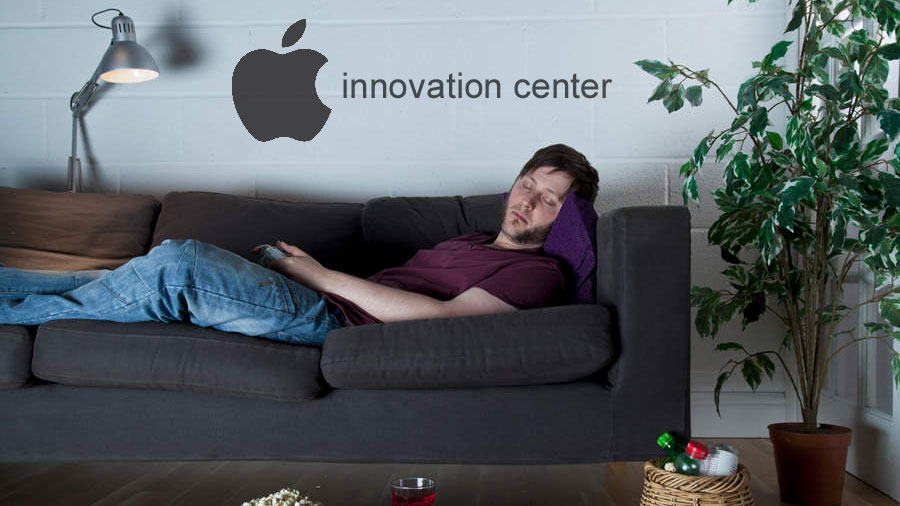Innovation's back at Apple and it's about bloody time
But let's not get carried away

Sign up for breaking news, reviews, opinion, top tech deals, and more.
You are now subscribed
Your newsletter sign-up was successful
Innovation. Once upon a time you couldn't utter the word without making a connection to a certain fruit-based company.
But ever since it decided that "resolutionary" was a word (it's really not, okay?) it's gone down hill in the innovation department and Apple seems to have past its best before date.
The last big innovative change from Apple - in the iPhone department at least - was way back in 2010 with the iPhone 4. It brought a new design along with a host of new features including a super fast processor and Retina display. Well played Apple.
Go past this though and the iPhone 4S was hardly ground breaking, and sure the iPhone 5 rocked up with a bigger screen, but please, that's not innovation.
Just not trying anymore
I can't berate Apple for launching incremental upgrades every 12 months while we're locked into two year contracts, because everyone's doing it - just look at the Galaxy S3 and Galaxy S4 or the Optimus G, G Pro and G2.
What I do take issue with is the fact it feels like Apple has just stopped trying - happy to rest on its incredibly loyal fan base who'll lap up anything new.
Of course you could argue: why should Apple do the extra leg work? Sure it's making a ton of money and what's not to love about that?
Sign up for breaking news, reviews, opinion, top tech deals, and more.
But what are we, the consumers, getting from it? A smaller bank balance and a "new" phone that your friends will think is the one from last years when you try and show it off. Thanks a lot, Apple.
The saving grace
All may not be lost, though. While the iPhone 5S made me shudder when it was confirmed and I feared for another unflattering incremental upgrade - which for the most part it is - there was one shining ring of hope.
That silver ring wrapping that iconic home button. Hello, what's this: Touch ID? Surely it's not really a fingerprint scanner? What, it is? It actually is! Well colour me intrigued.
Now before you jump down my throat with, "But fingerprint scanning has been around years", I'm aware of that, thanks. The innovation here is it's implementation - remember Apple is rarely the first to a technology, but it's usually the best when it comes to integration.
There's no ugly square scanner like the ones you find on laptops - the sleek installation into the iPhone 5S' home button means you barely even know it's there.
With the reader supporting multiple angles you're not left swiping your finger constantly until it finally registers - a quick placement over the button and you're done.
At the moment Touch ID only lets you unlock the handset and authenticate purchases in iTunes and the App Store, but considering you can register multiple fingers we wouldn't be surprised if future iOS updates see your finger power become more involved.
In short, it's a great little feature and I've no doubt that the likes of Samsung, HTC and LG will be bringing finger scanning tech to their next smartphones - undoubtedly set to be dubbed "copycats" by anyone connected to Apple.
There's more to do
But Touch ID is not enough. Apple is still plugging a handset design which arrived over three years ago and other than the scanner it's pretty poor it couldn't come up with anything more than an updated camera and quicker processor.
The eye-tracking and hand-waving controls on the Galaxy S4 are questionable, but they at least show willingness to develop new features. Even Nokia is arguably doing a better job when it comes to improving smartphone cameras.
So good job, Apple. It's nice to see you've finally woken the innovation team from their slumber. But stick the kettle on, these guys clearly need coffee before they can properly get going.
Here's what we thought of Apple's big iPhone launch event:

TechRadar's former Global Managing Editor, John has been a technology journalist for more than a decade, and over the years has built up a vast knowledge of the tech industry. He’s interviewed CEOs from some of the world’s biggest tech firms, visited their HQs, and appeared on live TV and radio, including Sky News, BBC News, BBC World News, Al Jazeera, LBC, and BBC Radio 4.